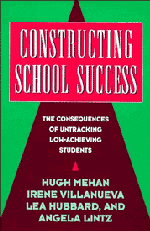Book contents
- Frontmatter
- Contents
- List of Figures and Tables
- Acknowledgments
- 1 Introduction
- 2 Tracking Untracking
- 3 Does Untracking Work?
- 4 Background Characteristics and College Enrollment
- 5 The Social Scaffolding Supporting Academic Placement
- 6 Organizational Processes Influencing Untracking
- 7 Peer Group Influences Supporting Untracking
- 8 Parents' Contributions to Untracked Students' Careers
- 9 Implications for Educational Practice
- 10 Implications for Theories Explaining Educational Inequality
- References
- Index
8 - Parents' Contributions to Untracked Students' Careers
Published online by Cambridge University Press: 05 June 2012
- Frontmatter
- Contents
- List of Figures and Tables
- Acknowledgments
- 1 Introduction
- 2 Tracking Untracking
- 3 Does Untracking Work?
- 4 Background Characteristics and College Enrollment
- 5 The Social Scaffolding Supporting Academic Placement
- 6 Organizational Processes Influencing Untracking
- 7 Peer Group Influences Supporting Untracking
- 8 Parents' Contributions to Untracked Students' Careers
- 9 Implications for Educational Practice
- 10 Implications for Theories Explaining Educational Inequality
- References
- Index
Summary
Yolanda Lucero is the youngest child of Raquel and Jorge Lucero. Yolanda, her sisters, and her parents live in a small house in a poor mexicano neighborhood a block away from the freeway on the San Diego–National City border. Yolanda, who graduated from Golden Gate High School with a 3.9 GPA, applied to and was accepted at UCSD, UCSC, SDSU, UC Berkeley, and the University of San Diego. She enrolled at UC Berkeley with financial support.
Mrs. Lucero said she was not actively involved in Yolanda's education. Although she volunteered to help in her daughter's elementary school classroom, she said she was never called. She concluded that it was because she didn't speak English; perhaps the teacher decided she wouldn't be able to help the children because she only spoke Spanish. A turning point in Yolanda's academic career occurred in third grade when Mrs. Lucero sent Yolanda to a school with predominantly white students in order for her to participate in the GATE program that was accepting Mexican-origin children for the first time [Fue la primera vez que tuvieron este programa para los Mexicanos. Y por eso, tuvo la oportunidad de participar en el programa]. Yolanda became increasingly aware of the contrasts between her and the other students when they talked about their fathers' work. Their “fathers were bank managers, worked with computers, and my dad [worked] in produce.” Thus, she learned that ethnicity, language, parents' education, and occupation all contributed to her distinctiveness at school.
- Type
- Chapter
- Information
- Constructing School SuccessThe Consequences of Untracking Low Achieving Students, pp. 157 - 183Publisher: Cambridge University PressPrint publication year: 1996
- 3
- Cited by



